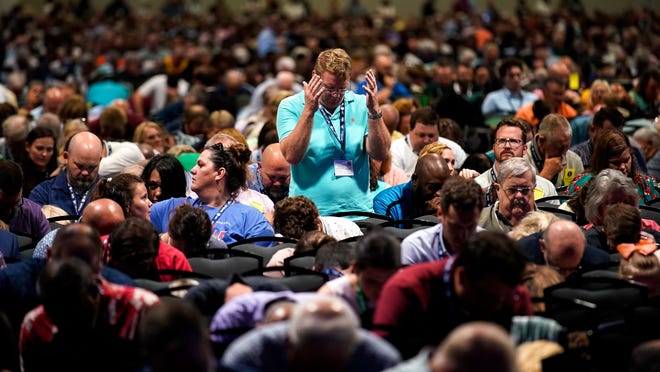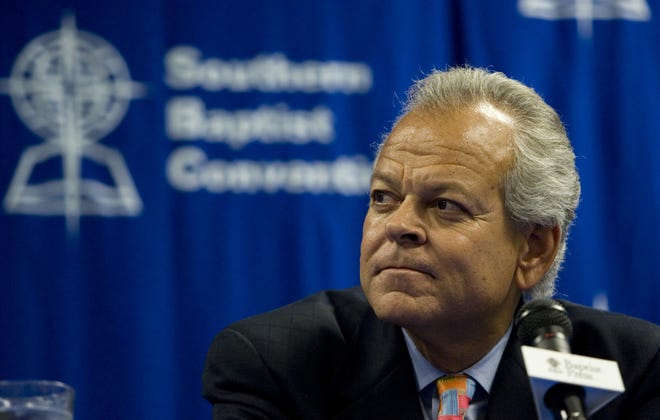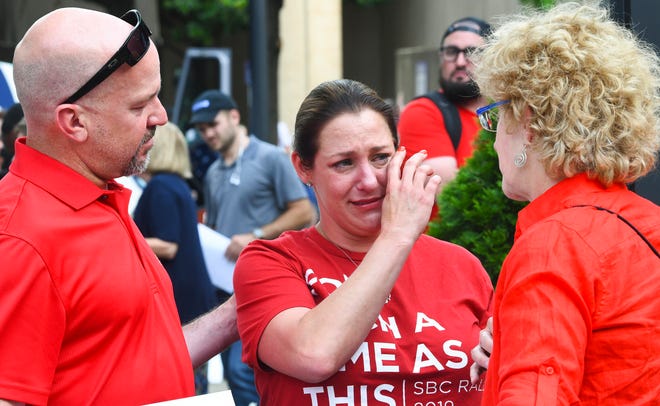
- The historic report on abuse response in within the Southern Baptist Convention was released Sunday.
- Former SBC President Johnny Hunt faces allegations, resigns from position at mission board.
- Guidepost Solutions, the firm conducting the investigation, issued 17 recommendations for reform.
Southern Baptist Convention leaders perpetuated a cycle of abuse for two decades by ignoring reports of sexual abuse and dismissing recommendations for reform, enabling a culture that retraumatized survivors, investigators found in a historic report released Sunday.
The nearly 300-page report from Guidepost Solutions contains explosive details about how the nation’s largest Protestant denomination responded to a growing sexual abuse crisis within its ranks.
The report publicly details, for the first time, a credible allegation of sexual assault against former SBC President Johnny Hunt a month after his term ended in 2010 and how high-ranking staff maintained a list with hundreds of names of ministers accused of sexual misconduct, but did nothing with it.
Meanwhile, leaders spoke poorly about abuse survivors behind their backs and downplayed the extent of the crisis. The SBC’s law firm repeatedly advised leaders not to take action when they were approached with concerns about abuse or reform, the report concluded.
WHAT TO KNOW:The bombshell Southern Baptist Convention sexual abuse report
Anticipated cost of inquiry:Top Southern Baptist Convention committee takes steps to rebuild after fall controversy
“Almost always the internal focus was on protecting the SBC from legal liability and not on caring for survivors or creating any plan to prevent sexual abuse within SBC churches,” Guidepost said in its report.
In the report, Guidepost makes 17 recommendations, including urging the SBC to establish an offender database, formally apologize to survivors and clarify standards for churches and clergy.
Guidepost’s team interviewed 330 people and reviewed five terabytes of data to investigate the SBC Executive Committee and its handling of abuse claims, treatment of victims, and resistance to reform between January 2000 to June 2021.
Thirty employees and an 86-member board of elected officials lead the executive committee, which manages denomination business when the Southern Baptist Convention isn’t gathered at its annual meeting.
This year’s annual meeting is three weeks away in Anaheim and Guidepost’s report will be front-and-center. Thousands of delegates, called messengers, will likely vote on measures related to Guidepost’s findings and recommendations.
The Nashville-based Southern Baptist Convention has more than 47,000 cooperating churches and 13.6 million members and is one of the most influential within American Christianity.
“This is the beginning of a season of listening, lamenting, and learning how to address sexual abuse in the Southern Baptist Convention,” executive committee board chair Rolland Slade and interim president/CEO Willie McLaurin said in a statement on Sunday. “In striving for this goal, we recognize there are no shortcuts.”
Executive committee members will meet for a special session on Tuesday, Slade and McLaurin said.
An independent task force of SBC leaders oversaw Guidepost’s work for the past seven months.
“We must resist the temptation to minimize, to look away, to find the easy ‘scapegoats’ for what was uncovered in this report, and instead ask ‘what could we have done better?’ and ‘what should we do now?’” the task force said in a cover letter accompanying the report.
After decades of survivors raising the alarm, a Houston Chronicle investigation in 2019 triggered a series of events that led to Southern Baptists calling for a third-party investigation. At the SBC annual meeting in June 2021, messengers overwhelmingly approved a motion that set the parameters of the investigation, including the establishment of the task force.
Last fall, executive committee members debated for weeks whether to waive attorney-client privilege and thus grant investigators access to confidential records. The members ultimately voted to waive privilege, a decision that Guidepost said in its report was “integral” for its investigation.
Abuse survivor Tiffany Thigpen said in an interview she met with investigators and told them that if they connected the dots and found the “buddy systems,” they would find corruption.
“And I feel like that is exactly what they found here,” she said.
June 2021 motion:Southern Baptist Convention takes stronger stand on sexual abuse and who can serve as a pastor
Debate over waiving privilege:Southern Baptist Convention committee grants access to privileged files amid sex-abuse inquiry
Investigators reviewed correspondence between executive committee staff and members, and attorneys from Guenther, Jordan & Price, the Nashville-based law firm that served as legal counsel to the SBC and the executive committee for 56 years.
Due to a fear of legal liability, “the lawyers were advising to say nothing and do nothing, even when the callers were identifying predators still in SBC pulpits,” investigators stated.
As these leaders sought to avoid these costs, however, it’s clear in the report they incurred a debt that future leaders will be paying off years to come.
“There are not adequate words to express my sorrow at the things revealed in this report,” SBC President Ed Litton said in a statement after the report’s release. “I am grieved to my core for those who have suffered sexual abuse in Southern Baptist contexts, both for those named in this report and the many who are not.”
Allegations against former SBC president
Hunt is accused in the report of sexually assaulting a woman at a beachside condo in Florida a month after he finished his second and final term as SBC president.
Guidepost investigators say Hunt pulled down the woman’s shorts, made sexual comments to her and then pinned her to a couch before groping her and violently kissing her. Later, in a separate conversation, he told the woman “he would like to have sex with her three times a day,” according to the report.
Hunt told Guidepost investigators in an interview he had no physical contact with the woman, but investigators determined Hunt was not credible. Investigators spoke with the woman and her husband, who is a pastor and had known Hunt for 25 years by the time of the alleged assault, four additional people, and reviewed other documentation the couple had retained.

Ahead of the release of Guidepost’s report, Hunt resigned May 13 from his job as vice president of evangelism at the SBC-affiliated North American Mission Board, a spokesperson confirmed Saturday.
Hunt released a statement on Sunday following the report’s release. “To put it bluntly: I vigorously deny the circumstances and characterizations set forth in the Guidepost report,” Hunt said. “I have never abused anybody.”
The woman and her husband have not shared the story publicly until they spoke with Guidepost investigators.
Shortly after the alleged incident in July 2010, the woman and her husband met with Hunt, who was then senior pastor at First Baptist Church in Woodstock, Georgia, and another pastor who works with Hunt. Hunt and the other pastor told the couple to not discuss the incident.
In the first meeting, Hunt tried to downplay the incident and stated, “thank God I didn’t consummate the relationship,” the woman and her husband told investigators.
Guidepost did not mention additional allegations against any other current or former executive committee members between 2000-2021. The SBC president, an elected position that presides over the annual meeting, holds a de facto seat on the executive committee.
Systemic inaction by SBC leaders
A select cohort of mainly executive committee staff, in consultation with attorneys from Guenther, Jordan & Price, did not escalate reports of abuse and sought ways to discontinue or slow down pushes for policy changes, investigators explain throughout the report.
Those leaders and lawyers “were singularly focused on avoiding liability for the SBC to the exclusion of other considerations,” the Guidepost report states. “In service of this goal, survivors and others who reported abuse were ignored, disbelieved, or met with constant refrain.”
The most prominent figure in the report is August “Augie” Boto, who worked for the executive committee between 1998 to 2019, first as a vice president then as general counsel and then interim CEO/president.
Boto’s long tenure puts him at the center of many flashpoints in the debate over sex abuse accountability in the SBC.
He led the charge in 2008 against a proposal for a clergy abuser database, resisted efforts by SBC President J.D. Greear to ensure greater accountability, and was among a group of staff and attorneys who influenced and then later mishandled the fallout of an inaccurate Baptist Press article about abuse survivor Jennifer Lyell.
Apology to Lyell:Top Southern Baptist committee apologizes to abuse survivor for mishandling case
Boto also ignored several reports about pastors accused of misconduct and said in an internal email that some survivor advocacy was due to “the devil being temporarily successful.”
Boto met with Guidepost investigators and said he still opposes a database and still believes the devil is responsible for the “magnitude” of focus on abuse in the SBC.
Meanwhile, Boto and another executive committee vice president maintained a list of accused ministers between 2008-2018 “yet never took any action to ensure that the accused ministers were no longer in positions of power at SBC churches,” investigators found.
The most recent version of that list had 703 names, nine of which are still active in ministry, investigators determined. Guidepost said it will engage with the credentials committee, which evaluates church cooperation, about the list.
Boto faced criticism in the report for at least 33 different examples, according to an analysis of Guidepost’s report.
Ronnie Floyd, former executive committee CEO and president from 2019-2021, and his deputy Greg Addison faced criticism in the report for 23 different examples collectively, according to a Tennessean analysis of the report’s findings.
Floyd leaves executive committee:Southern Baptist Convention committee president resigns amid controversy over sex abuse inquiry
Addison leaves executive committee:The Southern Baptist Convention has a lot of top leadership vacancies. So who’s in charge?
Investigators found attorneys with Guenther, Jordan & Price were often implicated in decisions to ignore or deter survivors, opt out of reform proposals and pressured Baptist Press to sanitize its coverage of the Caring Well Conference, an event to raise awareness about sexual abuse.
“They had no problem providing creative ideas on ways to reduce legal liability,” investigators concluded. “Overall, the legal advice focused on liability created a chilling effect on the ability of the EC to be compassionate towards survivors of abuse.”
Attorneys Jim Guenther and Jaime Jordan defended in an interview with investigators an instance in 2007 when Guenther sent Boto a plan for implementing an abuser database.
Guenther and Jordan mostly rejected the report’s assessment of their firm in a statement issued Monday. “We are greatly disappointed in the lack of understanding the report shows for the role and responsibility of legal counsel,” the Nashville attorneys said.
“As lawyers we are bound by professional rules of conduct to zealously protect our clients’ legitimate interests and to discuss the legal consequences of any proposed course of conduct,” Guenther and Jordan said.
Guenther, Jordan & Price resign:Southern Baptist’s longtime law firm resigns amid loss of attorney-client privilege in sex abuse inquiry
Boto and the attorneys weren’t the only ones who faced scrutiny. A total of 20 SBC leaders were specifically referenced in the report for actions related to sexual abuse claims.
Two of those were criticized for not following up with survivors via phone or email. Others faced criticism for events at their own churches, such as former SBC presidents Steve Gaines and Jack Graham for their handling of situations involving people at their churches who were accused of misconduct.
In a statement, Graham’s church denied how it is characterized in the report.
Survivor-inspired changes
Concluding its report, Guidepost issued an extensive list of recommendations to create new infrastructure for abuse response and prevention.
Specifically, Guidepost said the credentials committee needs significant improvements, including trauma and abuse training for credentials committee members, better communication to the public about the credentials committee’s purpose and limits, and new standards for evaluating churches, and 13 others.
Credentials committee new start:New Southern Baptist Convention committee reviewing sexual abuse allegations creates system to accept complaints
For the whole convention, Guidepost is recommending an offender registry to include the names of convicted and credibly accused abusers, which churches can voluntarily report to.
Guidepost’s recommendation for an offender registry “is a strong acknowledgement for a need for a network system,” said abuse survivor Christa Brown, who has been calling for a database in the SBC since 2006.
Brown said she has some questions about the recommendation at the outset. “But of course, this has always been a long game and advocacy work in this arena will continue for a very long time and into the future,” she said.

The firm’s 17 recommendations include survivor-focused proposals, including a compensation fund program, survivor support program, written apologies to survivors and a public memorial in front of the SBC office in Nashville.
“I thank God for the courage and persistence of the survivors and advocates who brought the Southern Baptist Convention to this moment,” Litton, the current SBC president, said in his statement.
“Amid my grief, anger, and disappointment over the grave sin and failures this report lays bare, I earnestly believe that Southern Baptists must resolve to change our culture and implement desperately needed reforms.”
Liam Adams covers religion for The Tennessean. Reach him at [email protected] or on Twitter @liamsadams.

